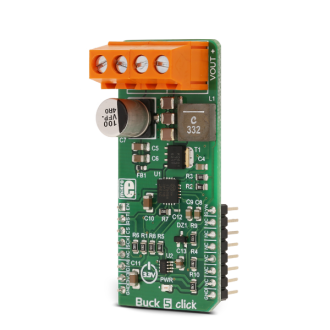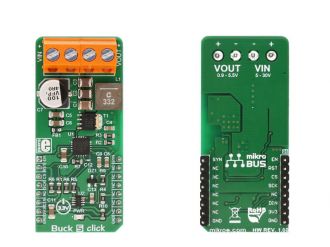
We strongly encourage users to use Package manager for sharing their code on Libstock website, because it boosts your efficiency and leaves the end user with no room for error. [more info]

Rating:
Author: MIKROE
Last Updated: 2018-07-17
Package Version: 1.0.0.0
mikroSDK Library: 1.0.0.0
Category: Buck
Downloaded: 4978 times
Not followed.
License: MIT license
Buck 5 click is a high-efficiency buck (step-down) DC/DC converter, which can provide digitally adjusted step-down voltage on its output while delivering a considerable amount of current.
Do you want to subscribe in order to receive notifications regarding "Buck 5 click" changes.
Do you want to unsubscribe in order to stop receiving notifications regarding "Buck 5 click" changes.
Do you want to report abuse regarding "Buck 5 click".


Library Description
Initializes and defines SPI driver and driver functions which can use for power supply control. This library offers a choice to set maximum output voltage, which can be between 1V and 5.5V. For more details check the documentation.
Key functions :
void buck5_powerOn() - Function for power ON chip.
void buck5_reset() - Function for reset chip.
void buck5_setOutputVoltage(uint8_t voltage) - Function for setting maximum output voltage.
Example description
The application is composed of three sections :
void applicationTask()
{
buck5_setOutputVoltage(BUCK5_VOLTAGE_1500mV);
Delay_ms( 2000 );
buck5_setOutputVoltage(BUCK5_VOLTAGE_3000mV);
Delay_ms( 2000 );
buck5_setOutputVoltage(BUCK5_VOLTAGE_4500mV);
Delay_ms( 2000 );
buck5_setOutputVoltage(BUCK5_VOLTAGE_3000mV);
Delay_ms( 2000 );
}
Other mikroE Libraries used in the example:
Additional notes and information
Depending on the development board you are using, you may need USB UART click, USB UART 2 click or RS232 click to connect to your PC, for development systems with no UART to USB interface available on the board. The terminal available in all MikroElektronika compilers, or any other terminal application of your choice, can be used to read the message.